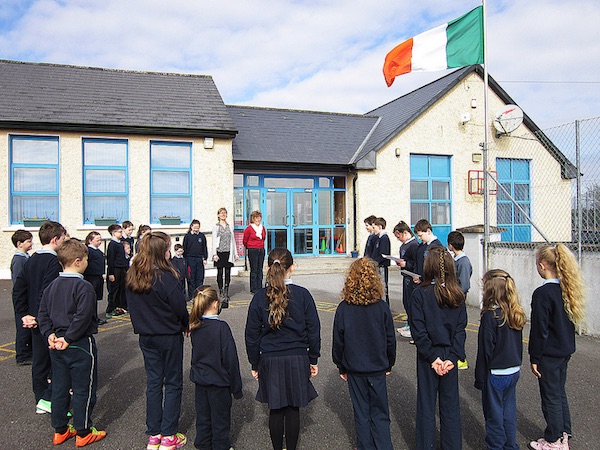
There has been strong criticism of a banner in honour of four parliamentary nationalists, three of whom died long before the 1916 Rising and one who bitterly opposed it, amid continuing preparations for the centennial.
The banner, erected apparently at the Taoiseach’s orders, features Henry Grattan, Daniel O’Connell, Charles Stewart Parnell and John Redmond. It has been described as an attempt to pay tribute to those historical Irish figures who supported devolution of powers from Westminster, rather than the use of violence in pursuit of independence.
Parliamentarians Grattan, O’Connell and Parnell died respectively in 1820, 1847 and 1891, while Home Rule advocate Redmond hated the Rising, which he described as a “wicked and insane” event.
Dublin City Council deputy city librarian Brendan Teeling said the idea for the banner had come from the Department of the Taoiseach. The council, the Department of the Taoiseach and the Office of Public Works have been liaising on the Rising commemorations, and one of their evident goals is to deflect attention away from the Republican struggle.
Amid a wave of criticism on social networks, Mr Teeling said the commemorations were intended to remember the Rising “in all its aspects”.
He said parliamentary nationalists had been supported by the majority of Irish people prior to 1916 and it would be wrong to leave them out. “It is not making a grand claim. It is not part of this revisionist stuff that’s going on,” he insisted.
However, some of the state’s efforts to mark the centennial have been better received.
Schools and colleges across Ireland this week held events to mark the significance of the Proclamation of Independence as part of the Easter Rising centenary.
As part of the unusual civics lessons, students read the proclamation and some learned the words to the Irish national anthem.
‘Proclamation Day’ - the biggest event so far in the 1916 commemorative programme - involved almost every school pupil in the south. A total of 25 primary schools across south Down and south Armagh also organised events to mark the occasion.
Pupils were also asked to write new proclamations setting out their own visions and ideals for the future. Schools also raised the tricolour and held their own colourful programmes with poetry, music and pageantry.
The event was hailed as a success after months of work by pupils, teachers, and parents. However, the outbreak of a national identity in Irish schools had its predictable critics north of the border.
Ian Paisley jnr posted a tweet mocking the Rising commemorations, saying that on July Twelfth [the anniversary of the Battle of the Boyne] “at least we [unionists] celebrate victory”. He added: “Celebrating a rising that failed - can’t even get a Taoiseach elected.”
Meanwhile, loyalists are threatening to block a planned commemoration parade through Belfast city centre next month. The march has been planned by the ‘North Belfast 1916 Easter Rising Centenary Committee’ to mark the calendar anniversary of the uprising on Sunday, April 24.
Organisers say it will be the first Easter Rising parade to pass through the city centre. Republicans normally mark the anniversary on Easter Sunday, but this year many events are also taking place on the actual date of the rebellion.
A loyalist group, Loyal People’s Protest, which regularly protests at republican parades, said on its Facebook page it intends to oppose the city centre march.
The dispute comes months after police banned republicans from marching down Royal Avenue and three years after loyalists rioted to prevent another nationalist parade.
One of the organisers, Paul Little, said they are aware there may be a protest.
“It will be the first Easter commemoration going through Belfast city centre and we will be conducting ourselves in a manner befitting those who fought in Dublin in 1916,” he said.
Mr Little said the parade will cause minimum disruption and will be clear of the city centre before shops open. “Irish republicans can’t be banned from Belfast city centre, which appears to be happening,” he said.
![[Irish Republican News]](https://republican-news.org/graphics/title_gifs/rn.gif)
![[Irish Republican News]](https://republican-news.org/graphics/title_gifs/harp.gif)

